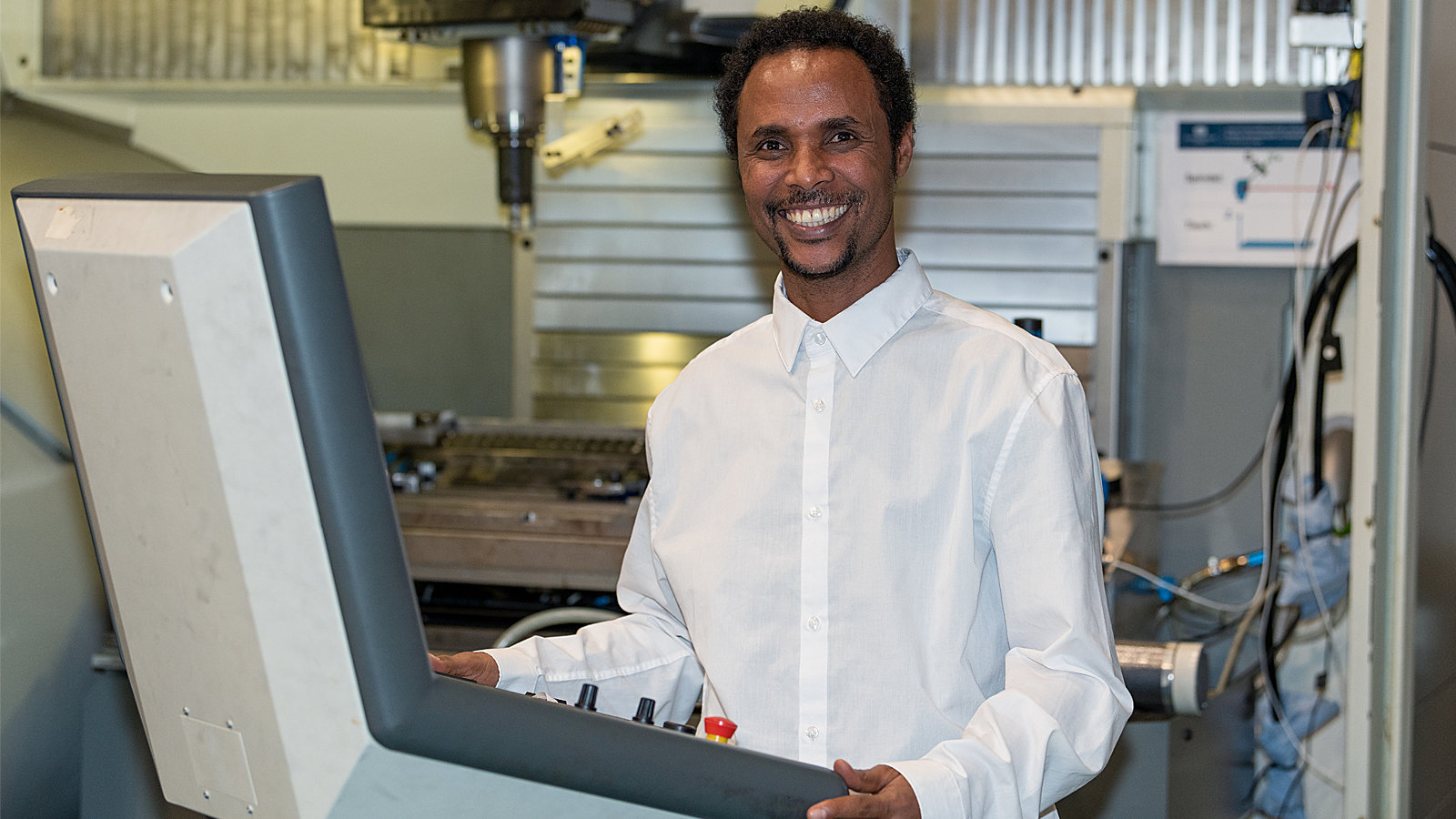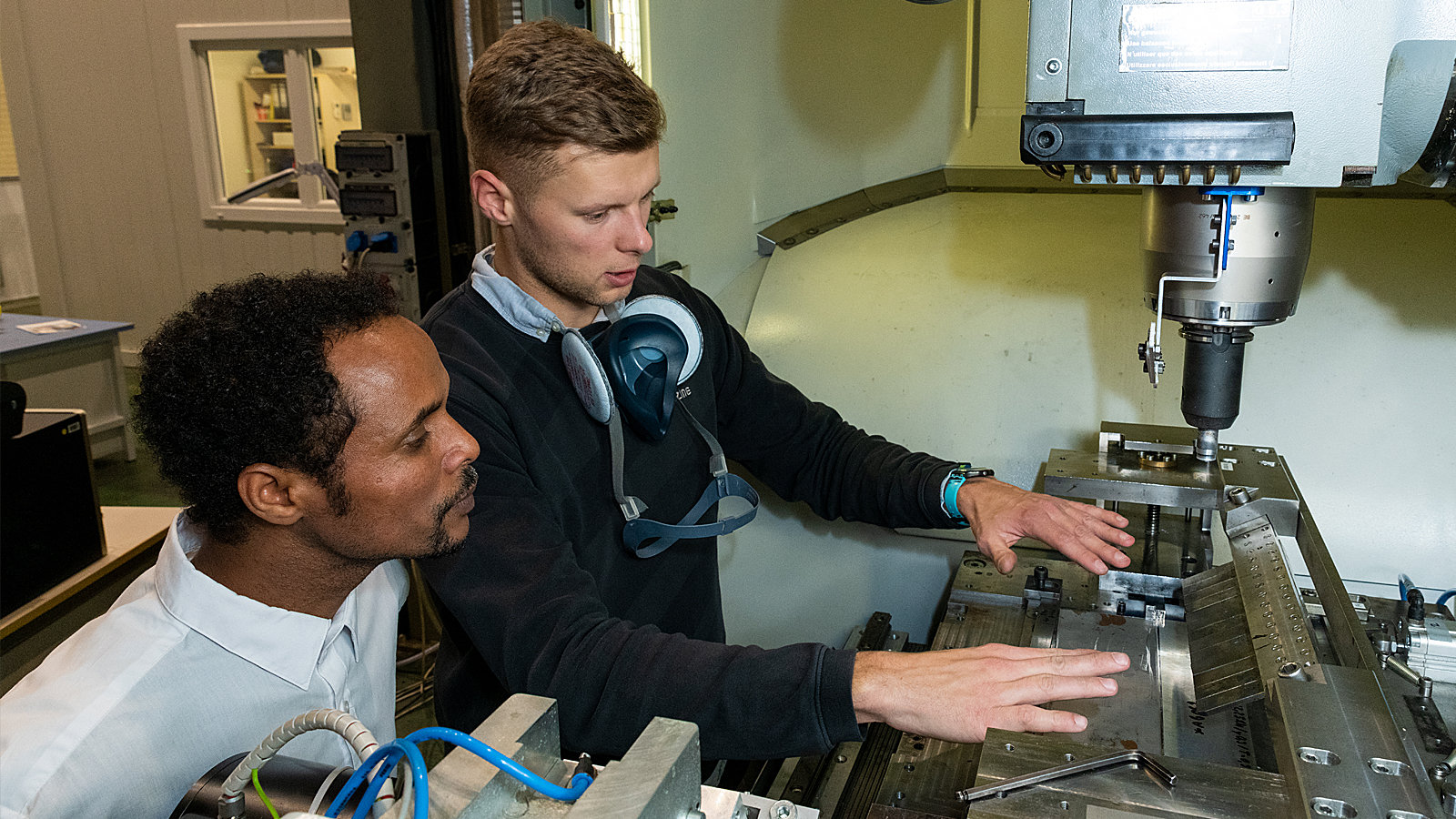"I Only Know Snow From the Movies“
With the help of a DAAD scholarship, Ethiopian Teklebirhan Fisseha can write his Ph.D Thesis in the field of Composite Materials – a great opportunity that also involves many challenges
-

Teklebirhan Fisseha from Ethiopia participate during "Home Grown Ph.D Scholarship Program“ at Chemnitz University. Photo: Andreas Gester -

Fisseha gets support from members of Professorship of Composites and Material Compounds such as researcher Marco Thomä. Photo: Andreas Gester
Nearly 8000 kilometers – that is how far Ph.D student Teklebirhan Fisseha is from his home country of Ethiopia. Since October, the 32 year old has been researching and writing his doctoral thesis under the Professorship of Composites and Material Compounds (Prof. Dr. Ing. Guntram Wagner) at Chemnitz University of Technology. His topic: "Experimental investigations and simulation on friction-stir welded aluminum and titanium composites.“ This is made possible by the "Home Grown Ph.D Scholarship Program“ of the German Academic Exchange Service (DAAD), for which Fisseha had successfully applied while at Chemnitz University.
Out of nearly 25 positions at the Composites and Material Compounds Group at the Institute of Materials Science and Materials Technology, 15 are occupied – among others, by doctoral candidates from India or Russia. However, this is the first from Ethiopia.
Challenges upon arrival – a "strong professorship“
The doctoral candidate chose Chemnitz University for a number of reasons. "The Professorship of Composites and Material Compounds is a central component of the IWW with altogether 3 professorships. It is very technologically modern and well-equipped and offers a well-trained staff of specialists in my area – that is why I wanted to come here.“ To ensure a smooth transfer of knowledge back to his home country, within the three years of the stipend, every six months he will fly back to Ethiopia for six months, and from there he will continue his research.
The Chair of Composite Materials first made contact with Fisseha via videoconference. When he first arrived in Chemnitz, the Ph.D student was faced with a number of challenges – for example, a bank account had to be opened and housing accommodations had to be found. This is not so easy for someone from so far away. The DAAD and the work group headed by Prof. Dr. Guntram Wagner helped Fisseha navigate the complicated organisational tasks. Through the scholarship program, urgently needed equipment such as a laptop was also able to be purchased.
Today, the doctoral student lives in one of the TU student residence halls. He is particularly pleased about his own room. "In Ethiopia, many students live in one room, which is exhausting. I enjoy the privacy here now!“
Differences between Ethiopia and Germany
There are also differences between the German and Ethiopian scientific systems. Fisseha: "In Germany, more emphasis is placed on practice during one‘s studies.“ He also sees differences in the seminars. "At universities in Ethiopia, the seminars are much larger. There are sometimes up to 60 students sitting in a seminar.“
Shortly after his arrival, the 32-year old caused a great deal of amazement during a regular meeting with his work group. Wagner: "He gave a talk to us about his home country, and he mentioned that in his home country, up to 50 different languages are spoken. In addition, he even used words and phrases from his German language course. He learned the words in his language course and applied them immediately. That left quite an impression on us.“
Keeping an open mind – "I can learn a lot here“
Fisseha got right to work and made contacts with other employees. "The workplace culture in Germany is very pleasant,“ says the doctoral candidate. "Everyone is very involved, I can learn a lot here. It is exactly like I imagined.“
Wagner: "Every day you can tell that Mr. Fisseha is enjoying his research work.“ He adds: "Based on the way he works, you realize that he brings a good primary education with him from Ethiopia.“ Moreover, Prof. Wagner is convinced that in a relatively short period of time, Teklebirhan Fisseha will be fully integrated as a scientific fellow, and his cultural differences will be of clear benefit and value to all those around him.
"Diverse and differing approaches are the basis of creative scientific thoughts and works,“ says Wagner. Therefore, the scientist attaches great importance to employees of different backgrounds. It is important to keep the mind open to other cultures. And, he adds, to reflect the own standards frequently.
Networking with the worldwide scientific universe
Prof. Wagner and his team are trying to involve international employees in scientific processes as quickly as possible. In addition to the joint publishing of works, the professorship also sends its international doctoral students to conferences domestically and abroad, in order to further network them in the international scientific community.
Teklebirhan Fisseha benefits from his open-minded scientific culture at Chemnitz University of Technology – and would like to continue working at a university after completing his doctorate: "I would like to expand my knowledge of materials science and pass those findings on to my students in my country.“ Moreover, he is already looking forward to the new insights that will come with his doctoral thesis.
Traveling through Germany
In addition to his work, the 32-year old also wants to see what Germany is all about, since he is here for the first time. Fisseha: "I have already been to Leipzig. But I would also like to visit Dresden and the Sächsische Schweiz.“ He is also particularly interested in the Haus der Geschichte in Bonn. He is also getting to experience the chilly temperatures here in Germany for the first time. “So far I only know snow from the movies.“
At the end of March 2019, Fisseha has to go back home. When he comes back at the end of the year, he already has a plan for his luggage: “I want to bring real Ethiopian coffee. Coffee comes originally from Ethiopia. Coffee in Germany is good, but we can compare both here!“ An intercultural exchange that in this case literally goes through the stomach.
About the person: Teklebirhan Fisseha
Teklebirhan Fisseha was born in Tigray, a region in the north of Ethiopia. He studied Mechanical Engineering and Manufacturing at Dire Dawa University in Dire Dawa, Ethiopia. He later worked as a lecturer in Mechanical Engineering at Dire Dawa University. The city is one of the largest in Ethiopia, and is located in the northeast part of the country.
(Author: Nina Schreyer / Translation: Jeffrey Karnitz)
Matthias Fejes
06.02.2019




